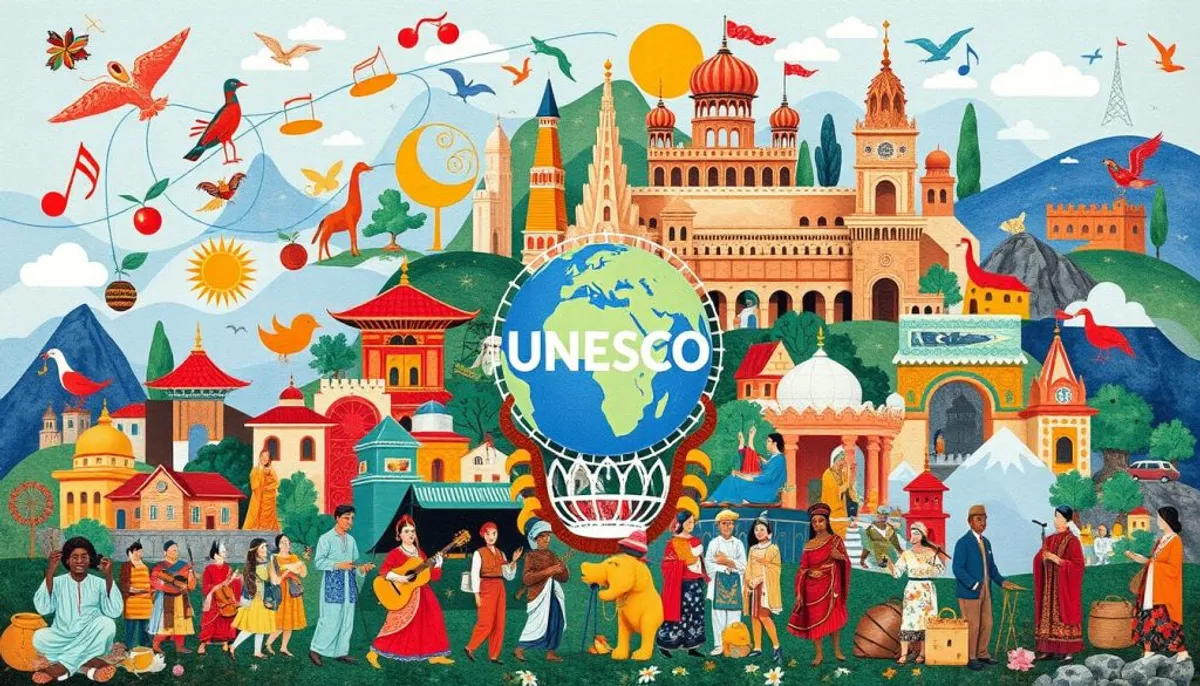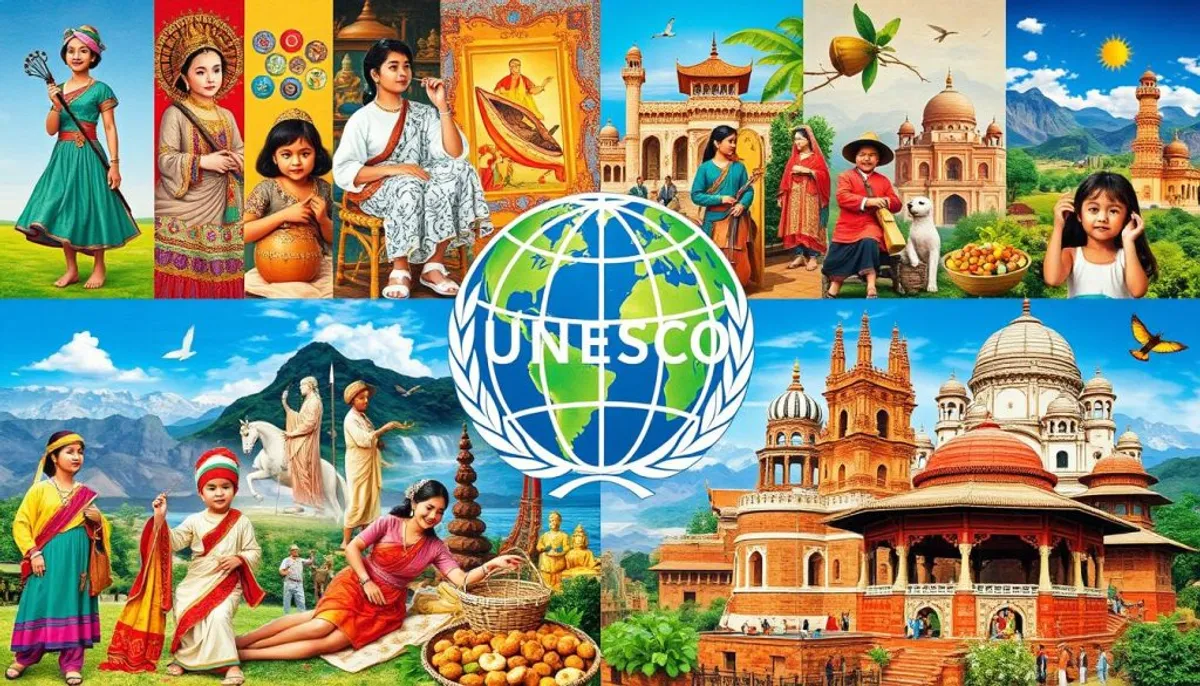UNESCO, with its 193 member states, occupies a central place in the definition and preservation of world culture. This organization defines culture as a set of characteristics unique to each society. It goes well beyond just arts and traditions, encompassing all aspects that shape the identity of a community.
Cultural diversity is at the heart of UNESCO's concerns. This richness is embodied by 35 legal instruments that frame the actions of member countries in the cultural field. These decisions reflect cultural importance, as shown by the recent classification of the Marquesas Islands as a World Heritage site.

UNESCO values both tangible and intangible heritage. Iconic monuments like the Arc de Triomphe or Mont-Saint-Michel are recognized, as are more subtle elements of our heritage. The baguette, a symbol of French gastronomy, has been inscribed in the intangible cultural heritage of humanity. This underscores the diversity of cultural expressions valued by the organization.
With Audrey Azoulay at its helm, re-elected for four years, UNESCO continues its mission to promote an inclusive vision of culture. This approach values every cultural element, from historical sites to living traditions, in the construction of our collective identity.
What is culture according to UNESCO
UNESCO considers culture as a complex set of distinctive traits. It encompasses the spiritual and material aspects that shape the identity of a society. This definition, adopted during the World Conference on Cultural Policies in Mexico in 1982, remains an essential reference.
The distinctive spiritual and material traits
Culture, according to UNESCO, is a blend of spirituality and materiality. It includes beliefs, traditions, as well as the concrete achievements of a society. This duality highlights the richness of cultural expressions in the world.
The intellectual and emotional dimensions
Intellectuality and emotionality are essential components of culture. They encompass arts, letters, sciences, as well as lifestyles and value systems. These elements form the foundation of a group's cultural identity.
The importance of value systems
Cultural values play a crucial role in the definition of culture. They guide behaviors, traditions, and laws of a society. UNESCO emphasizes their importance in understanding and preserving cultural diversity.
| Components of culture | Examples |
|---|---|
| Spiritual traits | Beliefs, philosophies |
| Material traits | Architecture, crafts |
| Intellectual aspects | Literature, sciences |
| Emotional aspects | Music, dance |

This comprehensive definition of culture by UNESCO allows for a better understanding of the issues surrounding cultural diversity and its preservation. It underscores the importance of protecting all aspects of cultural traits to maintain the unique identity of each society.
The fundamental components of culture according to UNESCO
UNESCO identifies key elements that constitute our cultural heritage. These components illustrate the depth and variety of human cultures.
The arts and letters
Arts and literature are central to cultural expression. They encompass various fields such as painting, sculpture, music, theater, and literature. These artistic expressions allow individuals to communicate their emotions, ideas, and experiences.
Lifestyles and traditions
Cultural traditions shape our daily lives. They encompass our customs, rituals, and social practices. These unique aspects determine a community's identity and are passed down from generation to generation.
Fundamental rights
UNESCO highlights the importance of human rights in the cultural context. These rights include freedom of expression, the right to education, and access to culture. They ensure that everyone can participate in the cultural life of their community.
| Component | Examples | Importance |
|---|---|---|
| Arts and letters | Painting, literature, music | Creative expression, sharing emotions |
| Lifestyles and traditions | Festivals, cuisine, clothing | Community identity, cultural transmission |
| Fundamental rights | Freedom of expression, right to education | Cultural participation, human dignity |
These components form the fabric of our cultural heritage. They emphasize the importance of preserving and celebrating cultural diversity in our modern world.
The role of culture in modern society
Culture is fundamental in our current society. It shapes our identity and influences social development. It also strengthens cultural diversity, which is essential for social cohesion and intercultural dialogue, according to UNESCO.
The cultural impact is manifested in our daily lives. The arts, traditions, and lifestyles enrich our heritage. UNESCO's World Heritage List, with over 800 sites, illustrates this diversity.
Culture is linked to social development. It encourages education, creativity, and innovation. Indigenous peoples, with their 5,000 languages and cultures, demonstrate this diversity.

The preservation of cultural heritage is essential. In 2013, the theft of over 1,000 cultural items from the National Museum of Mallaoui in Egypt highlights the importance of protecting our heritage. UNESCO's Convention on Illicit Cultural Property has 125 state parties.
| Cultural aspect | Impact on society |
|---|---|
| Arts and traditions | Enrichment of heritage |
| Language diversity | Promotion of intercultural dialogue |
| Historical sites | Preservation of collective memory |
| Socio-cultural practices | Strengthening social cohesion |
Culture, in its diversity, shapes our modern society. It contributes to sustainable development, innovation, and mutual understanding. Its role is crucial for a harmonious and inclusive future.
The preservation of cultural heritage
Cultural conservation is paramount for UNESCO. This global organization is committed to protecting our collective heritage in all its forms. More than 1,000 cultural sites are currently listed as World Heritage, illustrating the richness and diversity of our civilizations.
The protection of traditions
Ancestral traditions are an essential element of our identity. UNESCO promotes their preservation through various initiatives. For example, traditional French horseback riding and the French gastronomic meal are recognized as Intangible Cultural Heritage. These recognitions aim to preserve our unique cultural practices.
The safeguarding of cultural expressions
Cultural expressions encompass a vast spectrum of practices. In France, the French Centre for Intangible Cultural Heritage plays a crucial role in their safeguarding. It coordinates national efforts to preserve these intangible treasures, from artisanal techniques to local customs.
Cultural sustainability
Cultural sustainability is crucial for the future of our heritage. The European Heritage Days, initiated in France in 1984, illustrate this commitment. They offer free access to many cultural sites, thereby raising public awareness of the importance of our common heritage.
| Aspect | Key figure | Impact |
|---|---|---|
| Listed cultural sites | More than 1,000 | Global recognition |
| Sites at risk | More than 100 | Restoration funds unlocked |
| Natural heritage | Area equivalent to China | Protection of biodiversity |
Conclusion
The UNESCO vision of culture transcends geographical boundaries, revealing the deep essence of our humanity. It highlights the importance of culture in shaping our collective and individual identity. This integral perspective emphasizes the necessity of protecting our cultural heritage while fostering a cultural future that is varied and rich.
UNESCO, with its 193 member states, aims to promote cultural diversity on a global scale. The Framework for Cultural Statistics, created in 2009, illustrates its commitment to quantifying and valuing the influence of culture in our societies. This initiative guides cultural policies towards sustainable and inclusive development.
Ultimately, culture according to UNESCO transcends the abstract concept, becoming an essential foundation of our existence. It reminds us that our cultural heritage is a precious treasure to be preserved and passed on. By adopting this perspective, we contribute to forging a cultural future that is diverse, where every cultural expression is valued and welcomed.
RelatedRelated articles


